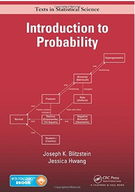Suppose n people are bidding on a mystery prize that is up for auction. The bids are to
Chapter 9, Problem 9(choose chapter or problem)
Suppose n people are bidding on a mystery prize that is up for auction. The bids are to be submitted in secret, and the individual who submits the highest bid wins the prize. Each bidder receives an i.i.d. signal Xi, i = 1,...,n. The value of the prize, V , is defined to be the sum of the individual bidders signals: V = X1 + + Xn. This is known in economics as the wallet game: we can imagine that the n people are bidding on the total amount of money in their wallets, and each persons signal is the amount of money in his or her own wallet. Of course, the wallet is a metaphor; the game can also be used to model company takeovers, where each of two companies bids to take over the other, and a company knows its own value but not the value of the other company. For this problem, assume the Xi are i.i.d. Unif(0, 1). (a) Before receiving her signal, what is bidder 1s unconditional expectation for V ? (b) Conditional on receiving the signal X1 = x1, what is bidder 1s expectation for V ? (c) Suppose each bidder submits a bid equal to his or her conditional expectation for V , i.e., bidder i bids E(V |Xi = xi). Conditional on receiving the signal X1 = x1 and winning the auction, what is bidder 1s expectation for V ? Explain intuitively why this quantity is always less than the quantity calculated in (b).
Unfortunately, we don't have that question answered yet. But you can get it answered in just 5 hours by Logging in or Becoming a subscriber.
Becoming a subscriber
Or look for another answer
